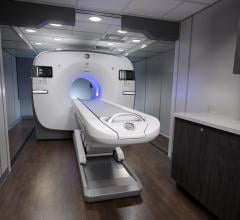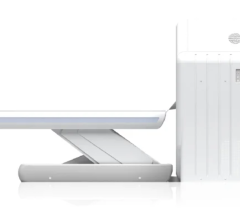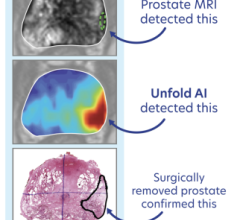June 17, 2016 — Decatur Memorial Hospital, Decatur, Ill., is now offering C-11 choline positron emission tomography (PET)/computed tomography (CT) and PET/magnetic resonance imaging (MRI) to patients who have biochemical relapse of prostate cancer. This comes after completing a two-year clinical trial to detect prostate cancer in earlier stages.
C-11 choline PET/CT uses a U.S. Food and Drug Administration (FDA)-approved tracer which, after injection, highlights the precise location of prostate cancer with much greater precision and sensitivity than traditional scans.
Decatur Memorial Hospital is one of a very few hospitals in the United States able to provide this imaging procedure.
“The adoption of a C-11 choline PET/CT imaging program puts the DMH Cancer Care Institute at the forefront of advancements in detection and treatment of prostate cancer,” said Decatur Memorial Hospital President & CEO Timothy D. Stone Jr. “This technology gives us an extremely unique tool to potentially save more lives through earlier detection and more effective treatment.”
Prostate cancer affects one in six men in America. In 2016, approximately 180,000 men will be diagnosed with prostate cancer, and approximately 26,000 men will die from the disease annually. According to published reports, most men who die of prostate cancer do so after either primary local or systemic therapy has failed.
Suspected prostate recurrence is based upon elevated blood prostate specific antigen (PSA) levels following initial therapy. Conventional imaging tools such as CT scan, bone scan or MRI might show the precise location of prostate cancer only once PSA has reached a value of 20.0 ng/mL – 30.0 ng/mL. The optimum PSA value for lesion detection was determined to be between 1.7 and 2.0 ng/mL to obtain a maximal clinical benefit for detection of prostate cancer in men who have a biochemical relapse after primary treatment. This earlier and more precise detection can allow treatment to begin sooner and to be more accurately targeted.
Following the injection of C-11 choline, prostate cancer cells absorb the choline and the scanner picks up the exact locations of tracer concentrations. Lesions appear as brightly illuminated spots or areas on the scan. C-11 choline has a rapid rate of decay, losing half of its radioactivity every 20 minutes, which means the tiny amount of original radioactivity is gone quickly from the patient’s body.
In the largest published study in the U.S. on C-11 choline imaging, there was a 32 percent increased detection rate of prostate cancer lesions which were not identified on conventional CT scan and bone scan.
DMH Cancer Care Institute recently concluded a two-year clinical research trial for recurrent prostate cancer. The trial was designed to measure the performance characteristics of C11-choline PET/CT and PET/MRI in the detection of metastatic prostate cancer in patients with a relapse of cancer after primary treatment.
Nearly 110 men between the ages of 51 and 86 underwent a C11-choline PET/CT and MRI scan at Decatur Memorial Hospital as part of this trial and were evaluated for evidence of metastatic prostate cancer. Results of the study are still in progress but assessment to date is consistent with reports from Europe and the Mayo Clinic.
“C-11 choline is changing the way we detect and treat prostate cancer. It allows us to pinpoint the exact location of cancer in the body,” said urologic oncologist Thomas H. Tarter, M.D., Ph.D. “This level of accuracy at the very early stages of cancer allows for faster, more effective treatment that can increase survival rates. It’s applied technology that touches patients.”
C-11 choline is produced on-site at Decatur Memorial Hospital with a cyclotron, developed by GE. Decatur Memorial Hospital was the first non-commercial, non-academic GE PETtrace site to develop and implement on-site use of a cyclotron to produce nuclear isotopes in the performance of various diagnostic imaging tests and day-to-day clinical operation of patient care.
For more information: www.dmhcares.com


 July 31, 2024
July 31, 2024 








